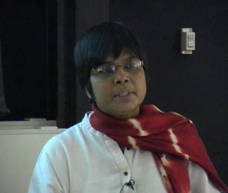

So it is not very surprising that marriage and family are areas where new Islamic movements have a strong appeal to young people. Islam offers a vision of society in which marriage is central. The well-known Hadith, that when a person gets married he has completed half of his religion, both I and other members of the team heard on many occasions when we talked to people about marriage. So it was very clear they actually bought into this and took this idea very seriously. And it's not very surprising because in Bangladeshi culture marriage is a must anyway. So they are getting the reinforcement from both sides.
And in this new Islamic vision society ought to be built around a proper Islamically-structured relationship between a man and a woman in which children can be given a sound and spiritually healthy upbringing.
So this Islamic vision provides a positive alternative to the dilemma which young people are facing today. On the one hand they have the option of going along with their parents' older version of Islamic observance, which they associate with their parents generation, but at the same time they are extremely critical of their parents' Islam, they say that their parents are patriarchal, they don't have any real commitment to the kind of Islam they follow, they are overly concerned with status symbols and the display of wealth, especially during weddings. The young people say that the kind of rituals and practices generally presented as Islamic by their parents' generation are not at all Islamic and can come close to Hinduism. And on the other hand they have Western secular values and ideas which people clearly see as inappropriate and not relevant to their lives any more. Often I have had people say to me, I've been there and done that, I've been pubbing and clubbing and it doesn't give me anything any more. Behaving and dressing in the Western style doesn't feel appropriate any more and doesn't answer their problems. So they are not happy with either of these two main options, and there comes a third option, the Islamic option we are talking about, and that seems to be more appealing.
I'll turn now to talk about a few of the young people I got to know, to give you some idea of how these issues worked out in their lives. Starting with the question of lack of security and general anxiety about relationship, we can look at the example of Rehana. Rehana is a Tablighi Jama'at follower, a married woman whom I interviewed in Bangladesh about three years ago. She said:
I think it makes me feel confident knowing that my husband is going to control his gaze by lowering his eyes when he sees other women. These days men and women are working together everywhere. Extra-marital affairs become so common. I have several friends who are not very religious, they suffer from a constant anxiety about their husbands, in case they get involved in some 'affair' with other girls. So far, I feel completely secure that my husband will not look at any other girls. He also feels the same if I go somewhere.
It is obvious to you what her concerns her. But it's worth taking note of a couple of things. First of all she is feeling very fortunate about being married to another practicing Muslim. Therefore they feel their marriage is very secure, they can trust each other, love on each other, she of course when she goes out is completely veiled including the face veil so her husband is not worried about her either. She is also feeling fortunate that she is not like her other girlfriends whose husbands are not practicing Muslims, therefore they are suffering from constant anxiety about their relationships etc, anything can go wrong at any time. But she does not feel like this, she says so far I feel fine.
Often young people had moved initially into a secular life-style. Many of the young people we got to know, both in the UK and Bangladesh, often talked of having wasted too much time idling away with other young people, often in mixed groups. Some had also been involved in alcohol and drugs, some had had problems with boyfriends or girlfriends, or had friends who had these problems. They felt that young people were destroying their lives. They had seen a lot. They saw families in disarray, leading to chaos and eventual breakdown, because, they said, there was no 'structure' in their lives for husbands and wives to behave within. This structure came up again and again, many people talked about how there was no structure and that was the source of the problem.